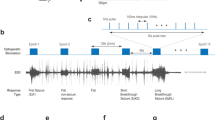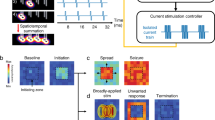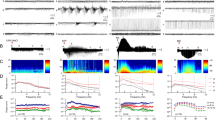Abstract
A RECENT communication by Herberg and Watkins1 reported that animals are more resistant to convulsions shortly after having had a convulsion than at other times. This note does not debate this temporary elevation of convulsive threshold but rather emphasizes an equally important phenomenon in which, over a longer period of time, the convulsive threshold is reduced.
This is a preview of subscription content, access via your institution
Access options
Subscribe to this journal
Receive 51 print issues and online access
$199.00 per year
only $3.90 per issue
Buy this article
- Purchase on Springer Link
- Instant access to full article PDF
Prices may be subject to local taxes which are calculated during checkout
Similar content being viewed by others
References
Herberg, L. J., and Watkins, P. J., Nature, 209, 515 (1966).
Morrell, F., in Brain Mechanisms and Learning (edit. by Delafresnaye, J. F.) (Blackwell, Oxford, 1961).
Author information
Authors and Affiliations
Rights and permissions
About this article
Cite this article
GODDARD, G. Development of Epileptic Seizures through Brain Stimulation at Low Intensity. Nature 214, 1020–1021 (1967). https://doi.org/10.1038/2141020a0
Received:
Published:
Issue Date:
DOI: https://doi.org/10.1038/2141020a0
This article is cited by
-
Inflammasomes in neurological disorders — mechanisms and therapeutic potential
Nature Reviews Neurology (2024)
-
Chemogenetic inhibition of subicular seizure-activated neurons alleviates cognitive deficit in male mouse epilepsy model
Acta Pharmacologica Sinica (2023)
-
Ictogenesis proceeds through discrete phases in hippocampal CA1 seizures in mice
Nature Communications (2023)
-
Antibiotics modulate frequency and early generation of epileptic seizures in zebrafish
Experimental Brain Research (2023)
-
Effect of ramosetron, a 5-HT3 receptor antagonist on the severity of seizures and memory impairment in electrical amygdala kindled rats
The Journal of Physiological Sciences (2022)
Comments
By submitting a comment you agree to abide by our Terms and Community Guidelines. If you find something abusive or that does not comply with our terms or guidelines please flag it as inappropriate.



